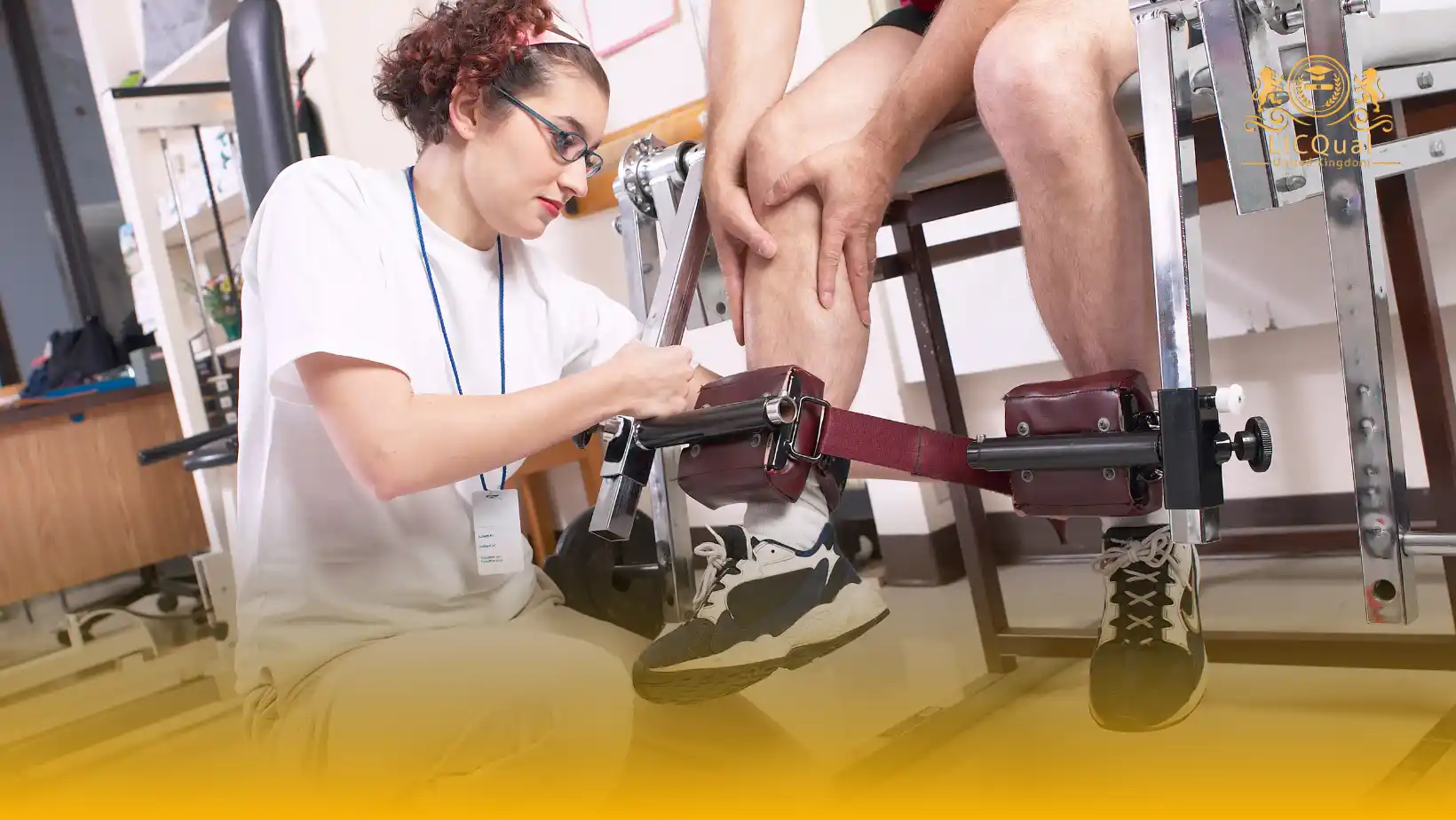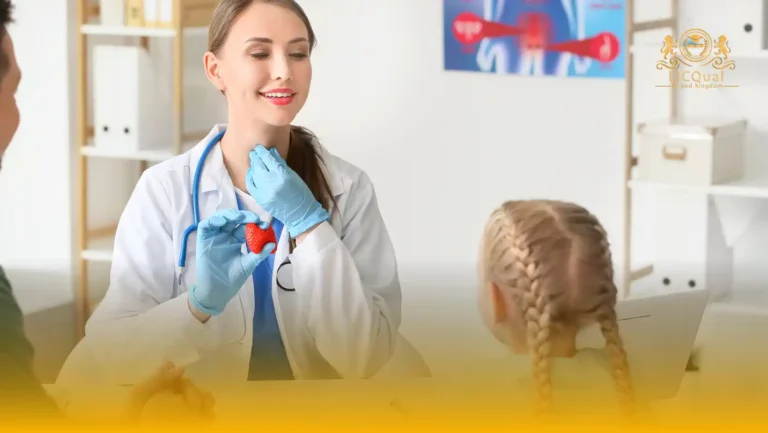The LICQual Level 6 Diploma in Sports Medicine (Dip SM) is an advanced qualification designed for healthcare professionals, sports therapists, physiotherapists, and clinicians who aim to specialize in the prevention, diagnosis, and management of sports-related injuries. This diploma is not intended for fresh candidates; it is specifically tailored for experienced professionals seeking to enhance their career prospects, broaden their knowledge, and strengthen their Continuing Professional Development (CPD).
Learners undertaking this diploma will gain a comprehensive understanding of sports medicine, including musculoskeletal assessment, injury rehabilitation, exercise physiology, and performance optimisation. The programme equips learners with the skills to apply evidence-based approaches in clinical practice, improve athlete care, and contribute to high-performance environments.
Centres delivering the LICQual Level 6 Diploma in Sports Medicine must uphold the highest standards of training. This includes employing competent and qualified staff, providing access to up-to-date learning materials, and ensuring all necessary resources are available to support learner success. Such professional infrastructure guarantees that learners receive a thorough, engaging, and practical learning experience, enabling them to confidently implement their skills in real-world sports and clinical settings.
By completing this diploma, learners will not only advance their professional standing but also enhance the quality of care they provide to athletes and clients. Whether seeking to expand clinical expertise, take on leadership roles, or contribute to research and development in sports medicine, this qualification provides the knowledge, skills, and recognition to achieve these goals.
Course Overview
Qualification Title
LICQual Level 6 Diploma in Sports Medicine (Dip SM)
Total Units
6
Total Credits
120
GLH
480
Qualification #
LICQ2200946
Qualification Specification
To enroll in the LICQual Level 6 Diploma in Sports Medicine (Dip SM), applicants must meet the following criteria:
|
Qualification# |
Unit Title |
Credits |
GLH |
|---|---|---|---|
|
LICQ2200946-1 |
Foundations of Sports Medicine |
20 |
80 |
|
LICQ2200946-2 |
Musculoskeletal Assessment and Injury Diagnosis |
20 |
80 |
|
LICQ2200946-3 |
Evidence-Based Treatment and Rehabilitation Strategies |
20 |
80 |
|
LICQ2200946-4 |
Sports Nutrition and Performance Optimization |
20 |
80 |
|
LICQ2200946-5 |
Research, Evaluation, and Evidence-Based Practice in Sports Medicine |
20 |
80 |
|
LICQ2200946-6 |
Professional Practice and Continuing Development in Sports Medicine |
20 |
80 |
By the end of this course, learners will be able to:
Unit 1: Foundations of Sports Medicine
By the end of this unit, learners will be able to:
- Critically evaluate the principles, scope, and historical development of sports medicine.
- Analyse physiological, biomechanical, and psychological factors influencing athletic performance.
- Examine patterns, causes, and epidemiology of sports-related injuries.
- Assess ethical and legal considerations in professional sports medicine practice.
Unit 2: Musculoskeletal Assessment and Injury Diagnosis
By the end of this unit, learners will be able to:
- Conduct advanced musculoskeletal assessments and accurately identify sports injuries.
- Apply diagnostic techniques to evaluate both common and complex injuries.
- Interpret clinical findings to inform treatment and rehabilitation planning.
- Identify injury risk factors and develop preventative strategies for athletes.
Unit 3: Evidence-Based Treatment and Rehabilitation Strategies
By the end of this unit, learners will be able to:
- Critically appraise pharmacological and non-pharmacological treatment options for sports injuries.
- Design and implement rehabilitation programmes tailored to individual athlete needs.
- Apply evidence-based strategies to support injury recovery and enhance performance.
- Monitor and adjust rehabilitation plans according to athlete progress and outcomes.
Unit 4: Sports Nutrition and Performance Optimisation
By the end of this unit, learners will be able to:
- Analyse the role of nutrition in supporting athletic performance and injury prevention.
- Develop personalised nutrition plans for athletes based on sport-specific demands.
- Evaluate dietary interventions and supplementation strategies in performance enhancement.
- Apply emerging research findings in sports nutrition to clinical and performance settings.
Unit 5: Research, Evaluation, and Evidence-Based Practice in Sports Medicine
By the end of this unit, learners will be able to:
- Critically appraise contemporary research studies relevant to sports medicine.
- Design and evaluate clinical audits, outcome measures, and intervention effectiveness.
- Apply evidence-based practice to enhance athlete care and injury management.
- Utilise research data to inform clinical decision-making and programme development.
Unit 6: Professional Practice and Continuing Development in Sports Medicine
By the end of this unit, learners will be able to:
- Demonstrate knowledge of professional ethics, governance, and standards in sports medicine.
- Apply leadership and management skills within clinical, sports, and organisational environments.
- Plan and engage in Continuing Professional Development (CPD) activities to maintain professional competence.
- Implement reflective practice to evaluate performance and improve clinical outcomes.
The LICQual Level 6 Diploma in Sports Medicine (Dip SM) is designed for healthcare and sports professionals who want to advance their knowledge in sports medicine, injury prevention, and athlete care. This course is ideal for doctors, physiotherapists, sports therapists, fitness specialists, and allied health professionals seeking practical skills and professional recognition. Whether you aim to enhance clinical practice, work with athletes, or move into leadership roles, this Level 6 Sports Medicine Diploma equips you with the expertise to excel.
Healthcare Professionals
- Doctors and general practitioners treating athletes and active populations
- Nurses involved in sports injury care and rehabilitation
- Physiotherapists working with musculoskeletal injuries and performance optimization
- Allied health professionals supporting sports teams or clinics
- Professionals seeking UK Level 6 recognized qualification in sports medicine
- Healthcare workers aiming to enhance patient outcomes in sports settings
Sports Therapists
- Sports therapists managing acute and chronic injuries
- Professionals developing rehabilitation programs for athletes
- Practitioners providing exercise-based injury prevention strategies
- Therapists working with sports teams or individual athletes
- Individuals seeking advanced knowledge in performance enhancement
- Professionals wanting practical skills applicable in real-world sports environments
Fitness and Exercise Specialists
- Personal trainers supporting clients with injury prevention and recovery
- Strength and conditioning coaches aiming to optimize athlete performance
- Fitness instructors managing safe exercise programs for active populations
- Professionals seeking Level 6 diploma for career growth
- Specialists integrating sports medicine principles into training programs
- Trainers aiming to improve client outcomes through evidence-based practice
Mental Health and Rehabilitation Practitioners
- Psychologists and counselors working with injured athletes
- Rehabilitation specialists supporting recovery after sports injuries
- Professionals integrating physical and mental health in athlete care
- Practitioners involved in performance psychology and motivation
- Individuals seeking advanced understanding of holistic athlete management
- Therapists aiming to enhance multidisciplinary collaboration in sports medicine
Students and Graduates
- Medical, physiotherapy, and sports science students seeking specialization
- Graduates aiming for clinical roles in sports or rehabilitation fields
- Individuals pursuing postgraduate diplomas for career advancement
- Students wanting practical and theoretical knowledge in sports medicine
- Learners aiming to gain a UK Level 6 recognized certification
- Graduates preparing for professional roles in healthcare and sports clinics
Career Advancers
- Professionals seeking promotions in hospitals, clinics, or sports organizations
- Individuals aiming for leadership roles in rehabilitation or sports medicine services
- Practitioners targeting specialized positions in athlete care
- Professionals looking to validate skills with UK-recognized certification
- Healthcare workers wanting to enhance career prospects and employability
- Professionals seeking practical and evidence-based skills to advance careers
To deliver the LICQual Level 6 Diploma in Sports Medicine effectively, centres must uphold high standards of professional expertise, training, and resources. The following requirements are essential:
- Qualified and Competent Staff: Centres must employ experienced trainers, clinicians, and sports medicine professionals with recognised qualifications. Staff should be capable of delivering both theoretical knowledge and practical guidance.
- Comprehensive Learning Resources: Centres should provide learners with access to up-to-date textbooks, research articles, clinical guidelines, case studies, and digital learning platforms to support in-depth understanding and evidence-based practice.
- Clinical and Sports Facilities: Centres must ensure access to appropriate clinical environments, rehabilitation labs, sports facilities, and relevant equipment to facilitate practical training and skill development.
- Assessment and Evaluation Systems: Centres must implement robust systems for learner assessment, feedback, and progression tracking to ensure all learners achieve the required competency standards.
- Health and Safety Compliance: Centres are required to adhere to all relevant health, safety, and regulatory standards to provide a safe and professional learning environment.
- Support for Continuing Professional Development (CPD): Centres should actively support learners in CPD activities, reflective practice, and ongoing professional development in line with international best practices in sports medicine.
Meeting these requirements ensures that learners receive a high-quality, professional, and engaging learning experience, equipping them with the knowledge, skills, and confidence to succeed in advanced clinical and sports medicine practice.
Assessment and Verification
All units within this qualification are subject to internal assessment by the approved centre and external verification by LICQual. The qualification follows a criterion-referenced assessment approach, ensuring that learners meet all specified learning outcomes.
To achieve a ‘Pass’ in any unit, learners must provide valid, sufficient, and authentic evidence demonstrating their attainment of all learning outcomes and compliance with the prescribed assessment criteria. The Assessor is responsible for evaluating the evidence and determining whether the learner has successfully met the required standards.
Assessors must maintain a clear and comprehensive audit trail, documenting the basis for their assessment decisions to ensure transparency, consistency, and compliance with quality assurance requirements.







